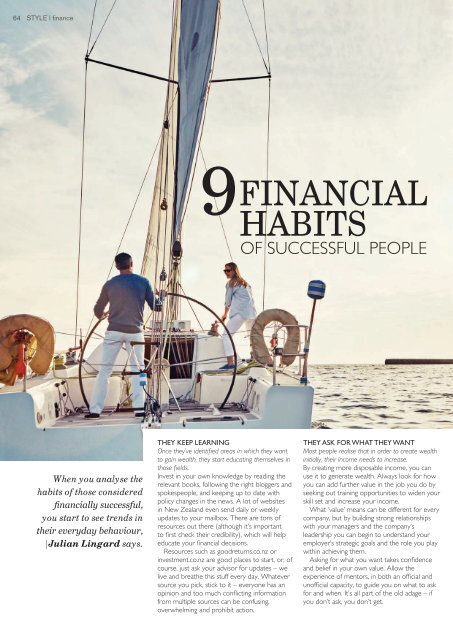Style: August 03, 2017
You also want an ePaper? Increase the reach of your titles
YUMPU automatically turns print PDFs into web optimized ePapers that Google loves.
64 STYLE | finance<br />
9<br />
FINANCIAL<br />
HABITS<br />
OF SUCCESSFUL PEOPLE<br />
When you analyse the<br />
habits of those considered<br />
financially successful,<br />
you start to see trends in<br />
their everyday behaviour,<br />
|Julian Lingard says.<br />
THEY KEEP LEARNING<br />
Once they’ve identified areas in which they want<br />
to gain wealth, they start educating themselves in<br />
those fields.<br />
Invest in your own knowledge by reading the<br />
relevant books, following the right bloggers and<br />
spokespeople, and keeping up to date with<br />
policy changes in the news. A lot of websites<br />
in New Zealand even send daily or weekly<br />
updates to your mailbox. There are tons of<br />
resources out there (although it’s important<br />
to first check their credibility), which will help<br />
educate your financial decisions.<br />
Resources such as goodreturns.co.nz or<br />
investment.co.nz are good places to start, or, of<br />
course, just ask your advisor for updates – we<br />
live and breathe this stuff every day. Whatever<br />
source you pick, stick to it – everyone has an<br />
opinion and too much conflicting information<br />
from multiple sources can be confusing,<br />
overwhelming and prohibit action.<br />
THEY ASK FOR WHAT THEY WANT<br />
Most people realise that in order to create wealth<br />
initially, their income needs to increase.<br />
By creating more disposable income, you can<br />
use it to generate wealth. Always look for how<br />
you can add further value in the job you do by<br />
seeking out training opportunities to widen your<br />
skill set and increase your income.<br />
What ‘value’ means can be different for every<br />
company, but by building strong relationships<br />
with your managers and the company’s<br />
leadership you can begin to understand your<br />
employer’s strategic goals and the role you play<br />
within achieving them.<br />
Asking for what you want takes confidence<br />
and belief in your own value. Allow the<br />
experience of mentors, in both an official and<br />
unofficial capacity, to guide you on what to ask<br />
for and when. It’s all part of the old adage – if<br />
you don’t ask, you don’t get.


















